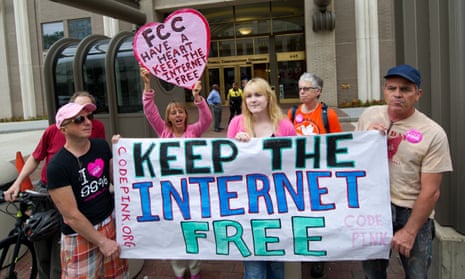Last Tuesday, Joel Mullaney, a software engineer from Watertown, Massachusetts, was browsing Reddit when he spotted a thread about people whose names and postal addresses had been falsely used to post comments on a government website attacking Obama-era open internet regulation.
Mullaney, 43, popped his address into the search bar on the Federal Communications Commission’s website and found his name attached to a comment that started: “The unprecedented regulatory power the Obama administration imposed on the internet is smothering innovation, damaging the American economy and obstructing job creation.”
“It was pretty ridiculous,” said Mullaney. “That’s pretty much the exact opposite of what I think.”
On Thursday, Mullaney added his name to a letter sent by 14 of the tens of thousands, if not hundreds of thousands, of people to have left similar – often identical – comments on the FCC’s website as the regulator moves to relax the strict rules regulating the internet brought in under Obama.
Ajit Pai, Donald Trump’s newly appointed head of the FCC, has said he wants to take a “weed-whacker” to the 2015 rules that regulate internet access in a manner similar to the regulation of other utilities like water or electricity.
After a massive campaign led by internet activists and backed by Obama, the FCC agreed to regulate internet service providers (ISPs) under title II of the telecommunications act. The ruling means that just as everyone gets the same electricity, ISPs can not create tiered systems of access and slow, or “throttle”, an online service or offer a high-speed lane to corporations able to pay more.
Critics charge that such lanes would allow ISPs to pick winners and losers online, favour their own services and potentially harm free speech. Pai and the cable companies argue the “net neutrality” rules – which have been unsuccessfully challenged in court – stifle corporate innovation and investment.
Now the two sides are at loggerheads again. The FCC has received over 2.7m comments on “restoring internet freedom” so far, and its systems crashed after comedian John Oliver lambasted the move on his HBO show, Last Week Tonight.
Mullaney’s letter, coordinated by internet activists Fight for the Future, calculates that as many as 450,000 of the comments on FCC’s website may be spam created by enemies of net neutrality.
“Whoever is behind this stole our names and addresses, exposed our private information in a public docket without our permission, and used our identities to file a political statement we did not sign on to,” the letter reads. The letter also warns that “hundreds of thousands of other Americans may have been victimized too,” they write.
Mullaney, whose supposed comment is still on the FCC’s site, said he was “embarrassed” to be associated with the comment and worried it might put off potential employers. “It looks bad for me; it’s not what people in my industry believe at all,” he said.
Asked about what, if anything, the FCC intends to do with all this spam, a spokesman directed the Guardian to comments from Pai’s most recent press conference: “I encourage broad participation in this rule-making as in any FCC rule-making, and what matters most are the quality of the comments, not the quantity,” said Pai.
“We will make our decision based on the facts that are in the record and on the relevant law that is presented – and obviously fake comments such as the ones submitted last week by the Flash, Batman, Wonder Woman, Aquaman and Superman are not going to dramatically impact our deliberations on this issue.”
Pai said hundreds of comments had been submitted under his own name. “Of course, this is not new: fake comments were filed in the 2014-15 proceeding under names like Donald Duck, Mickey Mouse, and Stalin, just to name a few. This time around, I think the bottom line is … I urge everyone who’s interested in this issue to participate in the process in an honest and forthright way, and that is, I think, the best way to make sure your voice is heard,” he said.
